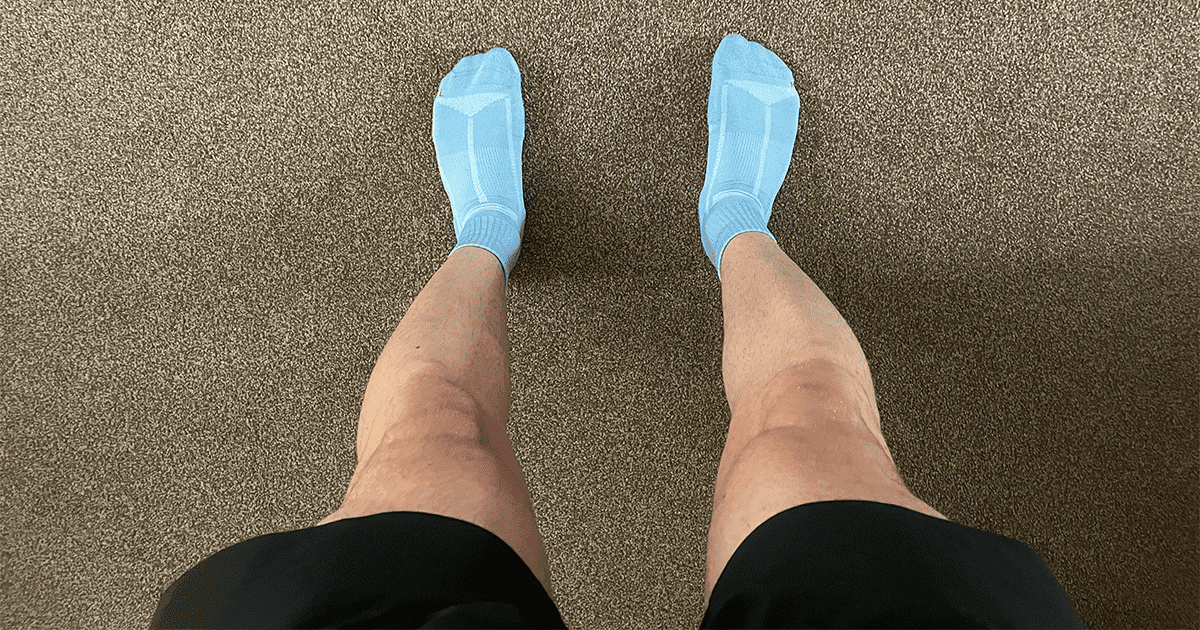What to do when you’re having a bad run
It’s cold, it’s raining, your leg hurts, and you’re only 5 miles into your long-run. What do you do?

Every runner has a bad run from time to time – we’ve just got to deal with it correctly. While it’s easy to throw in the towel and walk home, chances are you’ll regret it later on.
“Pain is temporary. It may last a minute, or an hour, or a day, or a year, but eventually it will subside, and something else will take its place. If I quit, however, it lasts forever.” – Lance Armstrong
This article will dive deep into what to do when you’re having a bad run. And as you may have figured by now, the answer does not lie with quitting, unless you genuinely have to.
Say NO to the negative self-talk.

Mile six, and it begins, that negative self-talk. That voice that tells you to give up, tells you your training isn’t worth it, and that you’ll never be as fast as you want to be. What do you do?
- Acknowledge it
Acknowledging the negative self-talk is the first step. No matter how loud you turn up your music or try to refocus your mind, it will come back. Understand where this negative self-talk is coming from. Maybe you missed out on a few hours of sleep, perhaps you didn’t eat enough before your run, or maybe you’re beginning to overtrain.
- Channel it
Take this negative self-talk and use it to fuel your run. Prove that inner voice wrong. So what, it’s telling you to give up? Use that as motivation to keep going, every step of the way. The more it talks, the more fuel you’re adding to the fire.
“It’s very hard, in the beginning, to understand that the whole idea is not to beat the other runners. Eventually, you learn that the competition is against the little voice inside you that wants you to quit.” – George Sheehan
Overcoming this negative self-talk and proving yourself right develops mental and physical strength – essential for faster and stronger running. Furthermore, you can draw on this adversity in the future, providing you with confidence in your own ability to not give up.
Recommended: 20 Running quotes to motivate you for your next run.
Dig deep

Easier than it sounds, you’ve got to dig deep and push through your run when the going gets tough. Whether it be an easy run, long run, or interval session, you’ve got to find it in you to get it done.
This is a challenging task and not for the faint-hearted. However, the more often you successfully push through this pain, the stronger you become mentally. This allows you to build a bulletproof mindset, one that will rarely consider quitting, even on the worst of runs or days with little to no motivation.
Tip: trick your mind by telling it that this is your last mile each mile until you finish.
Remind yourself what you’re training for
Reminding yourself of your goals and what you’re training for is a great way to increase your motivation. Calling it quits and ditching your run early will not get you to the finish line of a marathon. In fact, it will develop weak mental strength and more than likely cause you to do it again, and again.
Quitting early is not a habit you want to get into. Believe us. If you have to, write down your goals on your hand, on your bedroom wall, or tattoo it on your forehead… whatever it takes to be present, knowing exactly what you’re training for at all times.
If that fails, you can always blast Kelly Clarkson’s Stronger into your ears, powerful enough to turn a dog into a wolf.
Tip: Set clear training goals and remind yourself of these when you have a bad run. At the end of the day, it’s down to you to achieve these goals.
Play a motivational playlist

Nothing quite beats a motivational playlist to push you through those gruelling last few miles. From Kelly Clarkson to Daft Punk, fill your playlist with motivational songs to fire up your run. Heck, why not play them before your run too! Here are a few noteworthy mentions to include in your playlist:
- Kelly Clarkson – Stronger
- Daft Punk – Harder, Better, Faster, Stronger
- Fatboy Slim – Right here, right now
- Nelly – Heart of a champion
- Drake – Started from the bottom
You can also listen or watch motivational videos on YouTube, great for psyching yourself up before heading out in the rain, before a hard interval session, or even on a hot summer’s day.
It may be time to take a rest day

We all need rest days from time to time, and yes, that includes the greats such as Mo Farah, Eliud Kipchoge, and Callum Hawkins. There’s only so much pavement pounding our bodies can take, regular rest days allow our bodies to heal between runs, and may even increase motivation to get back out there.
Similarly, taking time aside from training prevents burnout and overtraining. If you’re having a bad run, this is likely a sign that your body needs time out, time to rest and recover. Failure to listen to your body may result in an injury, so take the time to sit on the sidelines for a short while rather than weeks or months as a result of an injury.
As a general rule of thumb: beginners should rest once every two to three runs at a minimum. The longer you’ve been running, likely, the less rest you need. However, that’s no excuse for not taking it easy once in a while, dedicating your evening to a session of Netflix over one-mile intervals.
Just be sure not to make this too much of a habit, it’s all about balance.
Keep track of your training.

All runners should keep some form of training log. Whether you opt for traditional pen and paper or log your runs on Strava, the choice is yours – just make sure you do it.
If you’ve had a bad run, go back through your training log. Look at how hard you’ve been training recently, maybe you’ve increased your weekly mileage, added a hard session, or have hit the gym one too many times.
If this is the case, as previously mentioned, then you’re perhaps stepping into the zone of overtraining. Take it easy for a while and enjoy some time off.
Tip: when tracking your training, keep notes of how you felt, e.g. felt a little sick, felt harder than usual, or ran when sleep deprived. This too, allows you to go back and analyse your training, locating the route of the problem.
Speak to another runner, workout buddy, or friend

Sometimes, it’s worth speaking to a like-minded individual about your bad run, especially if these are happening more often than you’d like.
At times, a set of eyes looking in is all we need. Perhaps you’ve been overworking yourself recently, stressed at work, or hitting the gym a little too hard. When we’re in the zone, we can sometimes become a little obsessed, unaware of how much we’re putting our bodies through.
Gaining an outside view of your training or current lifestyle is maybe all you need, providing that long-needed explanation of why you had a bad run, or are experiencing a series of bad runs.
You may in fact just be stuck in a rut, running the same route and engaging in the same routine over and over again, with little to no change. If this is the case, consider meeting with a friend and exploring a new stomping ground, breaking regular rhythm, and setting your training back on track.
Related: 9 Tips to help a friend start running today.
Know when to throw in the towel
A smart runner will always beat an injured runner. Always remember that. Sometimes there are real reasons to quit, and we must accept that. Maybe you’ve got an unusual pain in your knee, shin, or foot? If it doesn’t go away within the next couple of miles, you’re better off throwing in the towel and sitting this one out.
Chances are, running through musculoskeletal pain will cause more harm than good – it may even lead to an injury. As stubborn as us runners are, knowing our body and knowing when to quit can do us a whole world of good – and a whole load of time saved from being sidelined.
To conclude

Experiencing a bad run once in a while isn’t the end of the world. In fact, it could be a wake-up call, a reminder that you’re perhaps training a little too hard, too often.
The best thing you can do is take a step back to analyze your training and current stressors. Remember, even the world’s greatest athletes and runners need rest days, and that’s their full-time job. Take the time to rest once in a while, multiple times a week if you’re a beginner.
Most importantly, don’t beat yourself about it. Listening to your body is the single greatest thing you can do for your fitness, both physically and mentally.

Matthew is a lifelong runner, chief tester of all products, the founder of Running101, and freelance content writer for active brands. When he’s not writing, he enjoys lifting weights, cycling in the Lake District, and watching fast cars drive in circles on a Sunday. He also has a BA in sport, exercise and physical activity from the University of Durham.




